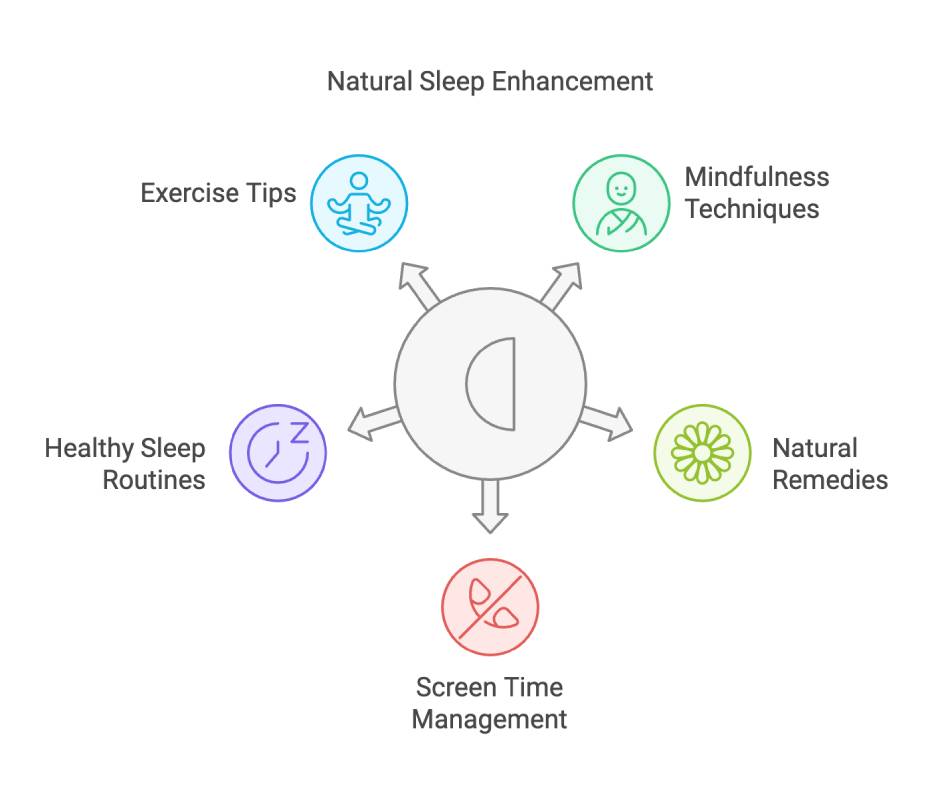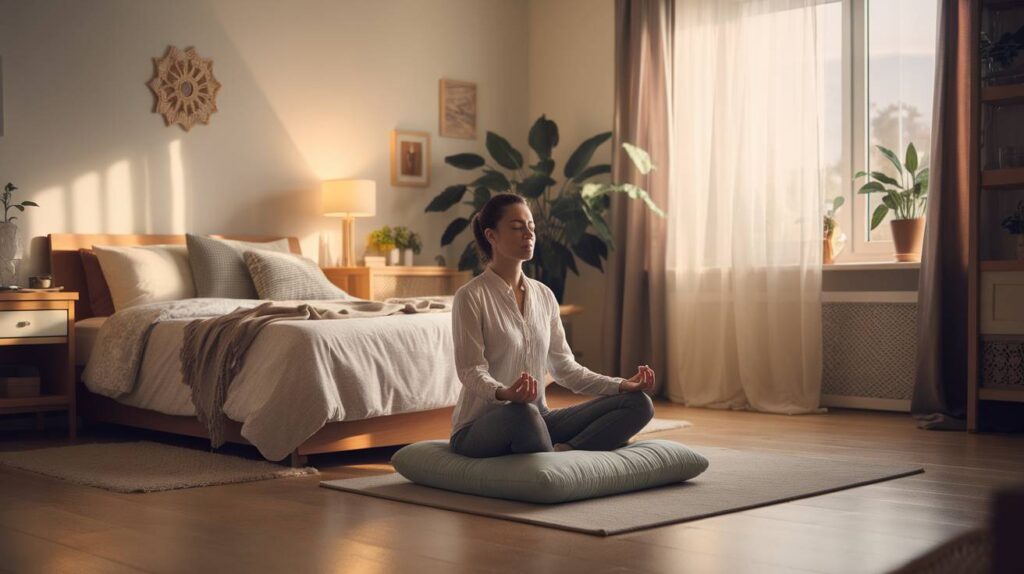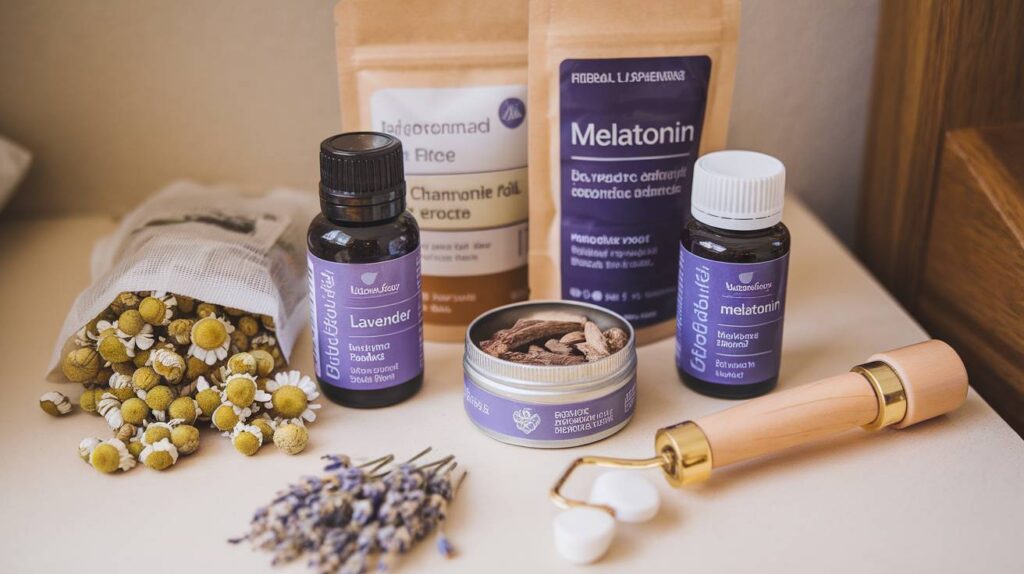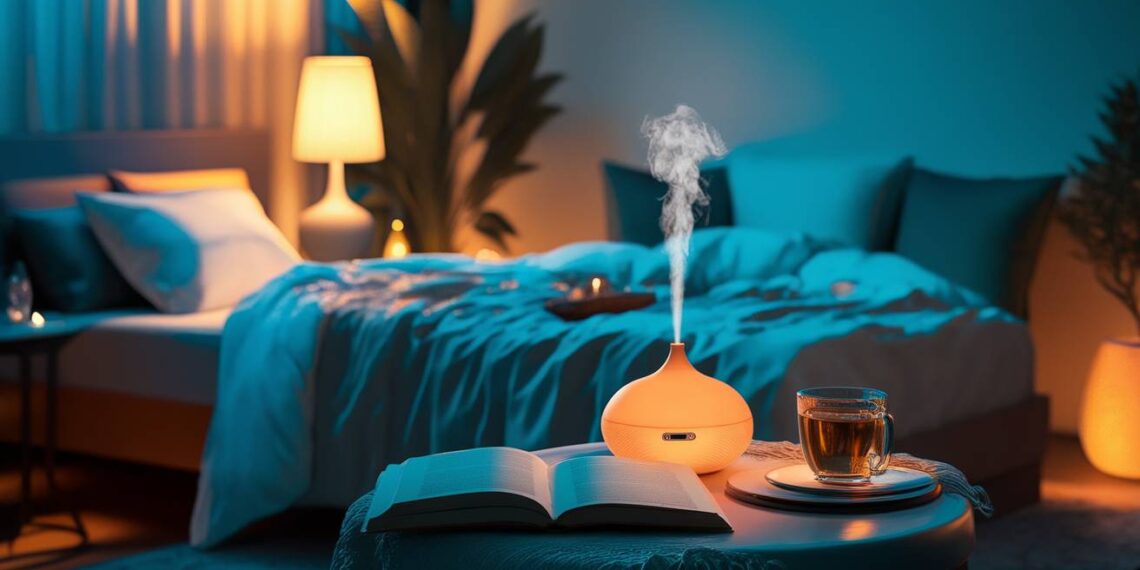Ever found yourself tossing and turning, yearning for a peaceful night’s rest? You’re not alone. In today’s fast-paced world, achieving quality sleep can seem like an elusive dream. Fortunately, nature and mindful practices offer a treasure trove of solutions to help you drift off effortlessly. From soothing breathing exercises to the magic of herbal supplements, this guide unveils effective strategies to elevate your sleep game. Dive in and discover how simple adjustments can transform your nights from restless to rejuvenating.
Key Takeaways
- Mindfulness Techniques: Incorporating guided meditation, breathing exercises, and body scans can significantly reduce stress and prepare your mind for sleep.
- Stress-Relieving Activities: Engaging in hobbies like reading, yoga, or sipping herbal tea helps ease anxiety and promotes relaxation before bedtime.
- Natural Remedies: Herbal supplements like Valerian Root and Chamomile, along with aromatherapy using essential oils, offer natural pathways to enhance sleep quality.
- Screen Time Management: Reducing exposure to blue light from screens and establishing a digital detox routine can prevent disruptions to your sleep cycle.
- Healthy Sleep Routines: Maintaining a consistent sleep schedule, creating a sleep-friendly environment, and mindful dietary choices are pivotal for achieving restful sleep.
- Exercise and Physical Activity: Regular physical activity, tailored to the right time of day, supports better sleep patterns and overall well-being.
- Dietary Tips: Consuming sleep-promoting foods and managing meal timings can aid in falling asleep faster and staying asleep longer.
Understanding Sleep Cycles
The Importance of Staying in Sync with Sleep Cycles
Keeping your sleep schedule on track is pretty much like hitting a ‘refresh’ button for your mind and body. A steady sleep routine brightens your spirits, sharpens your mind, and keeps your body humming along nicely. When you slip into a smooth snooze, your body has a chance to pull off some behind-the-scenes magic, like hormone-balancing acts and fixing up tissues.
Slamming the snooze button on disrupted sleep often spells trouble, like tossing and turning in the middle of the night or dragging through the day. Spotting odd sleep patterns lets folks jump in and take some chill steps to naturally reset their sleep rhythm.
| Yawns of Trouble | What’s Goin’ Down |
|---|---|
| Insomnia | Struggle to snooze, wake up way too often |
| Fatigue | Sleepy vibes all-day, zapped energy |
| Mood Swings | Grumpy, anxious, or feeling down |
| Brain Farts | Memory slipping, hard time focusing |
A Peek into Natural Sleep Patterns
Natural sleep vibes break down into several stages, all pitching in to ensure some solid rest. Knowing these stages helps us tune into our sleep groove and why it’s important to hit each note for a full recovery.
Sleep has two main types: Non-Rapid Eye Movement (NREM) and Rapid Eye Movement (REM) sleep. NREM breaks down even further into three stages, easing from light snoozing to deep slumber.
| Snooze Stage | What’s Happening | How Long It Lasts |
|---|---|---|
| N1 (Light Dozing) | Slipping from awake to asleep | 5-10 mins |
| N2 (Snooze Zone) | Body slows down, heart rate drops | 20 mins |
| N3 (Deep Chill) | Body recharge, immune system kicks in | 20-40 mins |
| REM Sleep | Dreamland, brain goes into overdrive | 10-30 mins |
A healthy night’s sleep bounces through these stages, looping roughly every 90 minutes. By tuning into these natural beats, folks can set the stage for truly restful sleep. Doing a bit of yoga before bed or trying deep breathing for sleep can give a boost to sinking right into those natural rhythms.

Lifestyle Habits for Better Sleep
Trying to catch more Z’s? Adopting a few smart habits can do wonders for the snooze department. Here’s how you can hit the hay like a champ.
Stick to a Sleep Schedule
Consistency is your best friend for catching better sleep. Hitting the sack and rising at the same time every day fine tunes your internal clock similar to setting your favorite playlist on repeat. It keeps you fresh during the day and sleepy at night.
| Day of the Week | When to Sleep | When to Wake Up |
|---|---|---|
| Monday | 10:30 PM | 6:30 AM |
| Tuesday | 10:30 PM | 6:30 AM |
| Wednesday | 10:30 PM | 6:30 AM |
| Thursday | 10:30 PM | 6:30 AM |
| Friday | 11:00 PM | 7:00 AM |
| Saturday | 11:00 PM | 7:30 AM |
| Sunday | 10:30 PM | 6:30 AM |
Avoid the weekend sleep-in party to keep your slumber on track. For more tips, check out our bit on how to sleep better naturally.
Wind Down with a Chill Routine
Time to slow that roll before bed. A relaxing routine is like a lullaby for your brain, telling it to chill and get ready for sleep.
Here’s how to get in the zone:
- Dim those lights
- Sink into a warm bath
- Get lost in a good book
- Try some mindfulness or just breathe
- Play some soothing tunes
You could also try sleep meditation techniques or work on some breathing exercises for sleep to really ease into it.
Make Your Bed a Sleep Sanctuary
The bedroom should scream comfort. Setting up a cozy, sleepy space makes all the difference.
Consider these tricks:
- Lighting: Keep it dark. Blackout curtains or an eye mask work wonders.
- Temperature: Keep things cool, somewhere between 60-67°F (15-19°C).
- Noise: Silence or white noise, that’s your choice for keeping it quiet.
- Bedding: A comfy mattress and pillows can turn things around.
Add a plant or two — they can be sleep-friendly too. For more bedroom magic, dive into our piece on natural sleep environment.
By sticking to a routine, chilling out before bed, and making the bedroom comfy, your sleep quality can skyrocket. Looking for extra help? Check out our tips on herbs for better sleep or yoga poses for sleep.

Dietary Tips for Better Sleep
We all know what it’s like to toss and turn, chasing that elusive good night’s rest. But hey, what if your pantry held the secret to snooze-ville? We’re talking about how the stuff you eat might just pull the strings on your sleep schedule. Certain bites boost your sleep game, while others trash it like last week’s leftovers. Let’s get down to brass tacks and chat about foods that’ll rock you to sleep and when to munch ’em.
Foods that Promote Sleep
Say goodbye to counting sheep and chow down on some zzz-inducing eats at dinner. These munchies are packing some serious sleep mojo:
| Food Item | Nifty Nutrients |
|---|---|
| Almonds | A burst of magnesium and tryptophan |
| Kiwi | Your serotonin buddy with a side of antioxidants |
| Oatmeal | Melatonin and a little carb hug |
| Bananas | Loaded with magnesium and potassium |
| Fatty Fish | Swimming in Omega-3s and vitamin D |
| Chamomile Tea | Soothing antioxidants with a tiny sleep potion |
Throw these into your evening routine, and you might just snuggle into sweet dreams sooner. Want more on sleepy snacks? Check out our thoughts on foods that help you sleep.
Timing of Meals and Snacks
When you eat could be the unsung hero or villain of your sleep saga. Big fries and a shake right before bed? Not so fast. Here’s the lowdown on getting your timing just right:
| Meal Type | When to Chow Down Pre-Slumber |
|---|---|
| Dinner | 2-3 hours before hitting the sack |
| Light Snack | 30-60 minutes before lights out |
Nix the caffeine jolts and spicy surprises late at night — they’re sleep’s mortal enemy. Go for quick snacks that keep hunger at bay while letting you drift off. Setting the stage with calming rituals during meals can make a world of difference too. Wanna know more? Peep our tips on how to sleep better naturally.
Switching up what and when you eat can make nights feel like a cozy dream without the need for sheep herding. And if you fancy making your sleep space a zen den, dive into the wonders of scents in our piece on aromatherapy sleep benefits.
Incorporating Physical Activity for Better Sleep
Getting your body moving is a solid way to catch some quality Z’s and keep your sleep rhythm humming. Workouts help folks unwind, dial down the anxiety, and boost overall health, setting the stage for a good night’s sleep.
Benefits of Exercise on Sleep
Staying active is like having a sleep VIP pass. Check out how it can make counting sheep a breeze:
| Benefit | Description |
|---|---|
| Kicks insomnia to the curb | Breaking a sweat can make insomnia a thing of the past by helping you snooze deeper. |
| Boosts sleep quality | Those who keep active often drift off more easily and wake up less frustrated in the night. |
| Cuts anxiety and stress | A quick jog or gym session lowers stress hormones, helping you chill before hitting the hay. |
| Lifts your mood | Endorphins from exercise are like little joy boosters, making you happier and more mentally peppy. |
For the scoop on how to spruce up sleep naturally, check our write-up on how to sleep better naturally.

Finding the Right Timing for Exercise
When you lace up your sneakers can tweak how you hit the sack. Here’s what you should know:
| Time of Day | Effects |
|---|---|
| Morning | Rise and grind! Morning workouts can help wake you up and keep your internal clock ticking, paving the way for sweet dreams. |
| Afternoon | Afternoon burnouts handle daytime stress and recharge your batteries, often meaning better sleep later. |
| Evening | Taking it easy with light exercises like yoga or stretching at night can help you relax. Hardcore workouts before bed? Yeah, not so much—they might just rev you up. |
Adding gentle moves like bedtime yoga can help you kick back and get ready to drift off. Sneak a peek at perfect forms in our piece on yoga poses for sleep.
Striking a balance between workouts and sleep habits sets up a path to a lifestyle that’s healthier and sleep that’s sounder. Regular exercise is your go-to for naturally syncing your sleep cycles and enjoying a more rejuvenating rest.
Stress Management Techniques for Improved Sleep
Let’s face it, getting good sleep is like finding the perfect cheese to wine match – tricky but totally worth it when you nail it. Managing stress is key to catching those quality Zs. Tossing in a pinch of mindfulness, a dash of meditation, and a splash of relaxing activities can work wonders for making sleep less of a lost art.
Mindfulness and Meditation
Mindfulness and meditation are like the calming beats in the busy party that is our brain. They help unplug from the chaos and focus on the now, calming anxious thoughts and letting us cozy up to sleep with a nicer mindset.
“Mindfulness isn’t difficult, we just need to remember to do it.” – Sharon Salzberg
Here’s how you can dive into these chill-out techniques:
| Technique | What It Does for You |
|---|---|
| Guided Meditation | Plug into a soothing recording and let it zap your stress away. |
| Breathing Exercises | Breathe in, breathe out – it sounds simple, but it cools your jets just right. Need pointers? Check out breathing exercises for sleep. |
| Body Scan | Tune into each part of your body, bit by bit, to shake off tension like a dog after a bath. |
Think you need more Zen time before hitting the hay? Explore sleep meditation techniques for tips on setting the ultimate nighttime vibe.

Stress-Relieving Activities
Letting loose with stress-busting activities can not only lighten the mood but also set you up for a dreamy drift-off. Making time for chill hobbies is like sending your brain a “chill-out and get ready for sleep” memo.
Check out these tire-me-out activities:
| Activity | Chill Vibes It Brings |
|---|---|
| Reading | Getting lost in a book is like giving your worries the cold shoulder. Aim for light stuff – brain snacks, not brain bonanzas. |
| Yoga | Stretch, breathe, and get those kinks outta your body. Peek at yoga poses for sleep for some moves that work wonders. |
| Crystals for Sleep | Amethyst or selenite, they say, have that calming glow. Curious? Head to crystals for sleep for more sparkly details. |
| Herbal Tea | Sipping on some tea before bed? It’s like whispering to your body, “Time to switch off, buddy.” Dive into homemade tea for sleep for cozy recipes. |
By mixing mindfulness and these chill activities into your nightly routine, ditching stress and welcoming quality sleep might just become your new norm.
Natural Remedies to Promote Better Sleep
Are you tired of counting sheep and still waking up groggy? You’re not alone. Luckily, there are a bunch of natural ways to help you sleep like a baby. Let’s chat about some herbal supplements and aromatherapy options that might just have you snoozing better.

Herbal Supplements for Sleep
Herbal supplements are a big hit for folks chasing a restful night without the drugstore meds. You’ve probably heard of these herbs; they’ve been around the block as natural snooze aids. Check out this cheat sheet showcasing the sleepy-time heroes and how to use them:
| Herb | What It Does | How to Use It |
|---|---|---|
| Valerian Root | Chill out and catch some Zs | 300-600 mg, half an hour before bed |
| Chamomile | Kick anxiety to the curb, sleep better | Sip 1-2 cups of tea, 30 mins before bed |
| Lavender | Smell your way to better rest | 2-4 drops on a pillow or diffuser |
| Passionflower | Fight the insomnia blues | 500 mg, half an hour before snoozing |
| Lemon Balm | Calm your nerves, ease anxiety | 300-500 mg, 30 minutes before sleep |
By the way, if you’re curious for more earthy secrets, swing by our piece on herbs for better sleep.
Aromatherapy for Relaxation
Essential oils aren’t just for yoga lovers or your super chill aunt. They can actually jazz up your sleep game, too, by creating a cozy, dreamy la-la land for bedtime. Here’s a list of famous oils and how they roll:
| Essential Oil | Why It Rocks Sleep | How to Use |
|---|---|---|
| Lavender | Relax and unwind | Diffuser, pillow top-up |
| Bergamot | Stress? Meet your match | Sniff or soak in a bath |
| Sandalwood | Soothe that busy mind | Diffuse or massage mixed with carrier oil |
| Cedarwood | Upgrade sleep quality | Diffuse or rub on pillow |
| Ylang Ylang | Calm down, power up | Diffuse or splash in bath |
To become the aromatherapy ace, dive into our essential oils for sleep guide. These scents will fit right into other calming practices like sleep meditation techniques or breathing exercises for sleep.
Mix these herbal buddies and aromatic wonders into your nighttime ritual, and you might just drift off naturally and keep that sleep cycle in check. These tricks keep it simple and help you manage sleep without popping pills.
Limiting Screen Time for Improved Sleep
As technology wiggles its way into every corner of our lives, our eyes are glued to screens more than ever, especially during those late-night hours. But this techy habit can mess with our sleep. It’s worth knowing how these digital screens mess with our snooze time if we’re keen on catching better Zzz’s.
Impact of Screen Exposure on Sleep
You see, the blue light blasting from our cherished gadgets—like phones, tablets, and laptops—can throw a wrench in our body’s natural snooze schedule. This blue light messes with melatonin, the sleep superhero hormone that waves its magic wand to lull us to sleep. Without enough of it, hitting the sack can feel more like a battle than a breeze.

Research shows that late-night screen time can lead to wonky sleep schedules, like a condition known as delayed sleep phase disorder. It’s something night owls, health nuts, and people slogging through night shifts often deal with. Here’s a look at how screen time can mess with your sleep:
| Screen Time | Sleep Quality Hit |
|---|---|
| Under 1 hour | No biggie |
| 1-2 hours | Getting harder to doze off |
| 2-3 hours | Tossing and turning galore |
| Over 3 hours | Welcome to Insomniaville |
Establishing Digital Detox Before Bed
Taming tech before hitting the hay can turn your sleep game from weak to winning. Giving yourself—and your eyes—a break helps the mind chill out and gets the body ready to sink into dreamland. Check out these chill tips for a pre-bed digital detox:
- Set a Device Curfew: Try flipping off screens at least 60 minutes before crashing.
- Craft a Chill Bedtime Routine: Dive into a page-turner, practice mindfulness, or meditate your way to calmness. Sleep meditation techniques can lend a hand big time.
- Ban Devices from the Bedroom: Turn the bedroom into a no-gadget zone to nix distractions and up your sleep quality.
- Explore New Hobbies: Swap screen time for soothing yoga or slurping homemade sleepy-time tea.
Mastering screen time can level up your sleep game, making life feel a whole lot fresher. Especially handy for sometimes-sleepless folks, hustling parents, or night-shift warriors on the hunt for natural sleep magic.
Establishing Healthy Sleep Routines
Getting that good night’s sleep ain’t just a dream folks, it’s within reach! With some steady habits and a bit of common sense, anyone can start snoozing better and feeling more rested every single day.
“The best bridge between despair and hope is a good night’s sleep.” – E. Joseph Cossman
Keep that Wake-Up Time Steady
Setting an alarm isn’t just for workers and students. Your body craves rhythm, so dragging yourself out of bed at the same time each day (yes, even on those lazy Sundays) can do wonders.
Here’s what’s in it for ya if you stick to this wake-up routine:
| Benefit | What’s in it for you |
|---|---|
| Regulated Snooze Cycle | Helps you hit the sack and rise & shine more effortlessly. |
| Clearer Moods | Keeps you chirpy and your mood in check all day long. |
| Better Zzz’s | Cuts down on those mid-day yawns and ups the night’s deep sleep. |
| More Energy | Gives you that extra pep in your step from dawn till dusk. |
Pondering ways to make your sleep even sweeter? Check out our piece on natural ways to sleep better.
The Art of Napping Well
Ah, naps—our afternoon saviors. But, the trick’s in keeping them short and sweet. A quick 20 to 30-minute snooze can recharge your mind, but overdoing it? Nah…that can mess up your night.
Let’s break down the dos and don’ts for napping:
| Do’s | Don’ts |
|---|---|
| Limit snoozes to 30 minutes tops | Avoid napping late in the day or evening |
| Choose a chill, dark spot for napping | Don’t use naps to play catch-up on chronic sleep debt |
| Pick a regular nap schedule | Don’t let nap time mess with your nightly sleep cycle |
By setting a fixed wake-up and making naps worthwhile, you’re on the fast track to better sleep hygiene. Want some more sleep tips? Dive into our articles on breathing exercises to unwind, chill-out meditation to sleep, and crafting a cozy sleep space.
Main Tips
- Establish a Consistent Sleep Schedule: Go to bed and wake up at the same time every day, even on weekends.
- Create a Relaxing Bedtime Routine: Incorporate activities like reading, meditation, or a warm bath to signal your body it’s time to wind down.
- Limit Screen Time Before Bed: Reduce exposure to blue light at least an hour before bedtime to enhance melatonin production.
- Incorporate Natural Sleep Aids: Use herbal supplements and essential oils to promote relaxation and improve sleep quality.
- Stay Active: Engage in regular physical activity, preferably earlier in the day, to support a healthy sleep cycle.
Final Thoughts
Prioritizing quality sleep is essential for overall health and well-being. By integrating mindfulness practices, embracing natural remedies, and establishing consistent routines, you can create an environment conducive to restful nights. Remember, small changes can lead to significant improvements in your sleep quality. Explore the strategies outlined in this guide and tailor them to fit your lifestyle, ensuring that each night brings you closer to the rejuvenating rest you deserve. Invest in your sleep, and watch as your days become more vibrant and productive. Sweet dreams are within your reach—take the first step tonight.
Conclusion
Achieving a restful night’s sleep is a harmonious blend of adopting mindful practices, embracing natural remedies, and cultivating healthy routines. By integrating techniques like guided meditation and breathing exercises, you can effectively reduce daily stressors that impede your ability to unwind. Engaging in stress-relieving activities not only enriches your evening but also sets the stage for a peaceful slumber. Natural remedies, including herbal supplements and aromatherapy, offer gentle yet potent means to enhance sleep quality without relying on medications. Managing screen time is crucial in safeguarding your sleep cycle, as the pervasive blue light from devices can significantly disrupt your body’s natural rhythms. Establishing a consistent sleep schedule and creating a conducive sleep environment further solidify the foundation for lasting rest. Additionally, incorporating regular exercise and mindful dietary choices ensures that your body is primed for optimal sleep performance. Embracing these comprehensive strategies will empower you to transform your nights, fostering not only better sleep but also a healthier, more energized you. Sweet dreams await as you embark on this journey to prioritize and perfect your sleep hygiene.
FAQs
What are some effective breathing exercises for better sleep?
Breathing exercises like the 4-7-8 technique or deep diaphragmatic breathing can help calm the nervous system and prepare your body for sleep.
How does aromatherapy improve sleep quality?
Essential oils like lavender and bergamot can create a relaxing environment, reducing stress and promoting faster sleep onset when used in diffusers or applied topically.
Why is maintaining a consistent sleep schedule important?
A consistent sleep schedule regulates your body’s internal clock, making it easier to fall asleep and wake up naturally, thereby improving overall sleep quality.
Can diet really affect my sleep?
Yes, consuming certain foods rich in magnesium, tryptophan, and melatonin, like almonds and bananas, can promote sleep, while caffeine and spicy foods can disrupt it.
What role does exercise play in improving sleep?
Regular physical activity helps reduce anxiety and stress, enhances mood, and can lead to deeper, more restorative sleep when timed appropriately.








